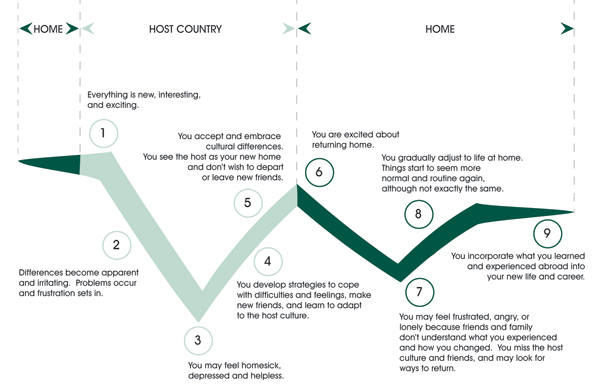Adjustment
Culture Shock
Everyone who travels, studies, or lives in a different culture experiences culture shock, which is described as the physical, psychological, and behavioral reactions that often occur when individuals are attempting to live, work, or study in unfamiliar cultural contexts. It is often illustrated using a curve, where the traveler has initial euphoria, followed by a low point, and then gradual adjustment to the host culture. Reentry or reverse culture shock also exists when the traveler returns to their home country - a similar behavioral curve in readjusting happens.

It is important to recognize that this happens, and your student may call/email/text and exhibit indicators of culture shock. Please know that this happens to everyone, and it isn't grounds for them to come home immediately. Even small things like getting a cold and not having the comforts of home can trigger sadness or difficulty adjusting. Encourage your student to disengage from social media that connects them to what they are missing out at home. Encourage them to do things they enjoy, such as exercising, reading, journaling, hanging out with local friends, or sightseeing. Remind them that they went abroad in order to experience new things. They will adjust to their new life and gain understanding of their host culture, gain independence, and increase their understanding of their own culture in time. Of course, if you think the situation requires professional guidance, our insurance provider can send your student contact information for health care providers such as therapists while overseas.

Everyone who travels, studies, or lives in a different culture experiences culture shock, which is described as the physical, psychological, and behavioral reactions that often occur when individuals are attempting to live, work, or study in unfamiliar cultural contexts. It is often illustrated using a curve, where the traveler has initial euphoria, followed by a low point, and then gradual adjustment to the host culture. Reentry or reverse culture shock also exists when the traveler returns to their home country - a similar behavioral curve in readjusting happens.
It is important to recognize that this happens, and your student may call/email/text and exhibit indicators of culture shock. Please know that this happens to everyone, and it isn't grounds for them to come home immediately. Even small things like getting a cold and not having the comforts of home can trigger sadness or difficulty adjusting. Encourage your student to disengage from social media that connects them to what they are missing out at home. Encourage them to do things they enjoy, such as exercising, reading, journaling, hanging out with local friends, or sightseeing. Remind them that they went abroad in order to experience new things. They will adjust to their new life and gain understanding of their host culture, gain independence, and increase their understanding of their own culture in time. Of course, if you think the situation requires professional guidance, our insurance provider can send your student contact information for health care providers such as therapists while overseas.
